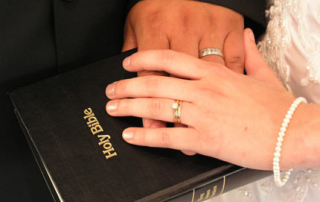"Wives, submit to your husbands as to the Lord. For the husband is the head of the wife as Christ is the head of the church, his body, of which he is the Savior." (Ephesians 5:22,23)
When the Apostle Paul begins this part of his letter to the Ephesians, it may seem he is "putting women in their place." However, God does not consider women to be second-class citizens. If we look back into the Old Testament, a wife was someone to be respected. Proverbs 31:10-31 describes a hard-working wife whose husband "has full confidence in her." (verse11) She has charge of her home, including "her servant girls," and she even runs a business out of her home. "She considers a field and buys it; out of her earnings she plants a vineyard….She sees that her trading is profitable…She makes linen garments and sells them…" (verses 15,16,18, 24) We read in the New Testament that "…women were helping to support God knew there would have to be order in the home so that the family would be stable and thrive emotionally and spiritually. This called for a leader of the family, and God chose the husband for this position. However, to avoid tyranny in the family, God gave a model for the husband-wife relationship to guide both spouses: The husband is a symbol of Christ, the wife pictures the Church. The wife should honor her husband's wishes as the Church honors her Head, Jesus Christ. (Knowing this is God's arrangement, a prospective bride should be very sure her husband-to-be demonstrates a Christ-like character!) However, the husband also has instructions. Paul says,"Husbands, love your wives, just as Christ loved the church and gave himself up for her." This is a huge responsibility. A loving husband truly cares for his wife's total welfare and wants his wife to think, to share her opinions, to study God's word, and to contribute to decisions. He wants his wife to be active in the Lord's work and in finding solutions to challenges in the family. In I Corinthians 7:4 Paul writes, "The wife's body does not belong to her alone but also to her husband. In the same way, the husband's body does not belong to him alone but also to his wife." Although he is here referring to physical relations between spouses, this principal shows that the husband is not to be a tyrannical decision-maker. He is given the responsibility to make final decisions for the good of the family, but only after prayerfully considering his wife's input.











